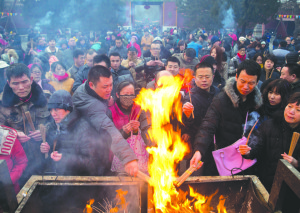By: Greg Perciavalle | The Duquesne Duke

Happy New Year. Chinese New Year, that is.
The Lunar New Year, celebrated on Jan. 31, is the traditional Chinese celebration of the beginning of a new calendar year in Chinese culture. Other surrounding Asian cultures also celebrate the Chinese New Year, such as Taiwan and the Philippines.
It is the zodiac year of the horse.
According to Tracy Zheng, who teaches Chinese language at Duquesne, Lunar New Year is a big event and the largest holiday in Chinese culture. Families will travel for the opportunity to be together for the reunion dinner. It warrants a big celebration and a bigger feast of fish, pork, duck, chicken and others.
“In Chinese, fish also means surplus… like extra, for a good beginning to start the New Year,” she said.
Professor of Asian art Mrea Csorba said that Chinese New Year is “the major holiday of the year for China.”
Friends and family will migrate to each others’ houses for a reunion dinner in a mad dash that sometimes involves “queuing up for railroad tickets for two days or more until all the trains are sold out” and it’s common to buy standing room only tickets for an 18 hour train ride.
Csorba stated that this holiday can be celebrated for up to two whole weeks. This year it is from Feb.1 to Feb. 18. The hardest part about celebrating in America is “scoring a banquet table at your favorite Chinese restaurant,” which sounds harder than it seems.
Another crucial practice of New Year’s Eve is a thorough cleaning of the house. Zheng agreed that the saying “out with the old, in with the new” applied to the Lunar New Year, saying that most people even subscribe to the tradition of buying new clothes specifically for the New Year.
Following a deep clean, a Chinese house will be decorated in commonly recurring colors of red and gold. Lanterns are a frequently used decoration that will be hung from the door and the ceiling, along with other varied paper crafts. Zheng said that there is less work to do than during Christmas time, but it is still similar to Christmas decorating.
The color red is profusely utilized in the celebration. As a gift-giving holiday, parents will give their children red envelopes containing money instead of purchasing other gifts. A traditional red costume, called tangzhuang, is a silk garment that originated in the late Qing Dynasty of China which lasted from 1644 to 1911. President of the Chinese Culture Association Iang Guo, (or Henry, as most people call him), a senior finance major, chuckled and said that the tangzhuang is fairly antiquated, worn more as a novelty for the festivities than as an actual outfit.
“Sometimes you will see people on TV wearing them [tangzhuangs], but they change clothes during the program,” Guo said.
The holiday is celebrated similarly, with a celebrity hosted television special like Dick Clark’s New Year’s Rockin Eve, and features performances such as dancing, music and magic shows.
In Guo’s hometown of Taiyuan, China, he celebrated the holiday as a week-long event, where each day was celebrated with a different theme, the first three days visiting family and friends.
He agreed that visiting friends, a common theme for the important first three days, goes with the philosophy surrounding the New Year that one should keep the good things in his or her life and be rid of the bad.
The celebration is so big, Zheng said, that people commonly receive a full week of vacation from work. If they happen to be working during the holiday, Guo says they will receive a large compensation for their time.
Guo and the Chinese Culture Association will be hosting a Lunar New Year Celebration of their own on Thursday in the Union Ballroom from 5 to 8 p.m. which will feature food and games.
